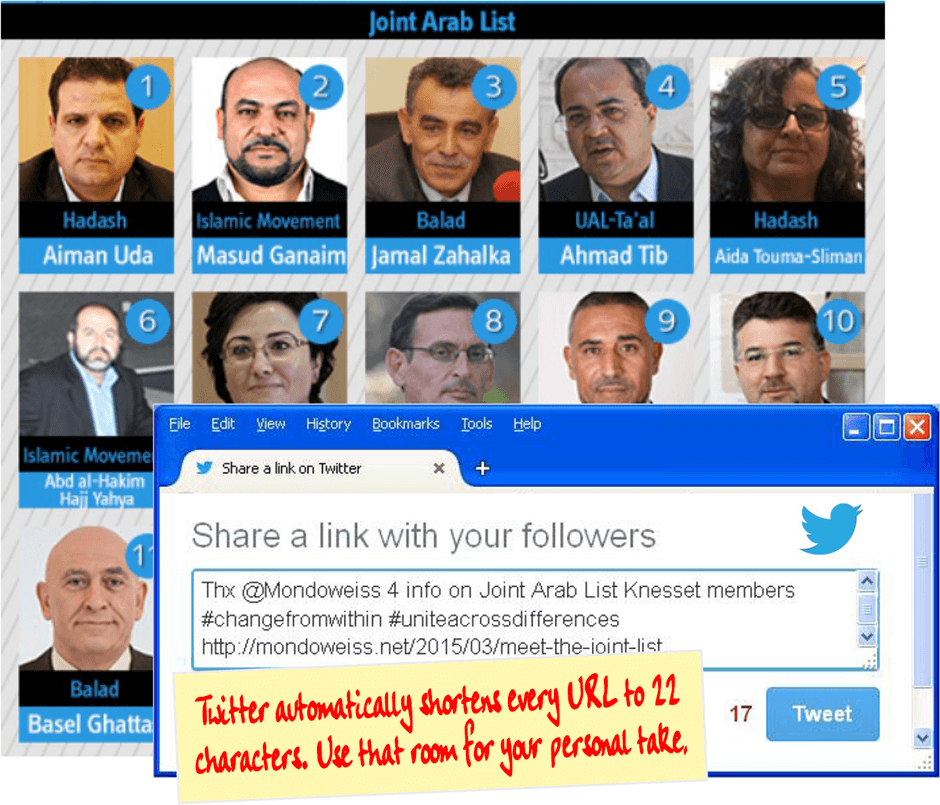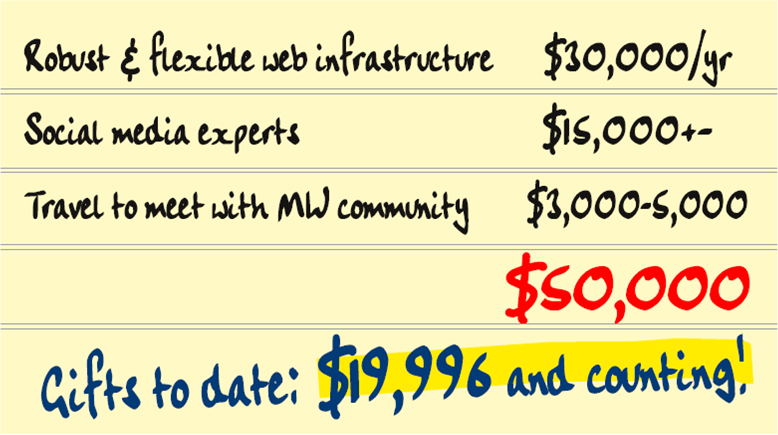Why are we asking you to share stories you read on Mondoweiss? Because we choose every entry on the site for its value in shedding light on people’s lives in Israel/Palestine, and advancing the many brave efforts to make those lives fairer, safer and freer. We believe that publishing a wide range of eloquent voices can raise the level of discourse, challenge widespread lies, and help change minds for better policy. The image above gives a sample of the voices who come to you through Mondoweiss: just seven of the site’s dozens of posts over a recent ten-day stretch.
Those voices deserve to reach more people—thousands more. And you, our community of readers, are the key to making that happen. Facebook, Twitter and other tools enable you to easily share resources with hundreds of people. We ask for your help to turn up the volume, by distributing the stories that touch you and by donating whatever you can to maintain—and increase—Mondoweiss’s ability to publish these voices.
You know how to share on Facebook; you retweet all the time; and you certainly know how to forward an email. But here are some tips to make your sharing easier and more influential.

The mechanics. Have you used the sharing buttons on Mondoweiss.net? They’re at the bottom of each article, just before comments, and to the left as you scroll down the article. These buttons make sharing fast and easy for you, and they show us—and other readers—which stories reached the most people.
Maximize the impact. Research has shown that people give most attention to messages that: are personalized; evoke an emotional response; come from a trusted sender; and are concise. One study found that when communication both evokes emotion and is personalized, it is more than twice as likely to get recipients’ attention.
So you have a better chance at drawing friends’ attention when you share a Mondoweiss article if you also share your opinion or emotional response, or ask a question. Even a brief comment like “This story surprised me” attracts more views than the same link posted without comment.
Take a moment to tell friends why you wanted them to see this story. Because your feelings matter to them, they will see news they otherwise might miss.

Consider your audience. You have friends and family who will appreciate every Mondoweiss post, and you know other people who can be moved by the right stories. And if you’re like most of us, there are people in your circles who are hostile to the ideas at Mondoweiss.
To avoid being disregarded, think about who will read what you share. One handy tool in Facebook is their built-in list called “Acquaintances”; you can assign to that list anyone you prefer not to send difficult messages, and then set the audience on each post to “Friends except Acquaintances.” Use this and Facebook’s other tools to select your audience strategically.
Also, both Facebook and Twitter allow you to use #hashtags and @mentions to grab the attention of the people that you want to see an important piece of news. And of course, if you ever want to make sure we see something, just reach out @Mondoweiss!
Make a Difference: Turn Up The Volume
Mondoweiss is today a major resource for justice in Israel/Palestine because of you. Your attention, your comments, your word of mouth, and your donations.

We are proud of the content we’ve been able to deliver using minimal resources, but to increase Mondoweiss’s impact, we need you to spread the word and provide financial support.
With less than a week left, the current campaign has raised 40 percent of our $50,000 goal—from just 235 people. Can you join them? If you gave in December, please give again now. If you missed the year-end appeal, it’s not too late! If just 3% of those reading donate $50 or $100, we will exceed the goal.
Mondoweiss brings the world essential facts and ideas voiced by those ignored elsewhere. The louder we can make those voices—the larger the audience who hears them—the sooner Palestinian demands for justice will be addressed. Please give today to keep growing this community’s influence and reach.




Just donated $100,-
I have a bad memory about the “Megaphone”
This in 2006 from Jerusalem Post:
As Al-Jazeera station takes to the air in English and with other new Arab English-language media initiatives such as the Ramallah-based Palestine Times fresh off the press, Israel has begun effectively using a new weapon in its public diplomacy arsenal to fight the media war on the Web – a locally-developed computer software tool called the “Internet Megaphone.” The Foreign Ministry itself is now pushing the idea, urging supporters of Israel everywhere to become cyberspace soldiers “in the new battleground for Israel’s image.” The Megaphone, which was first reported on in The Jerusalem Post when it made its debut in July during the Lebanon war, alerts activists about polls and articles about Israel on the Internet and enables them to express their support or opposition by e-mail. After just four months, it has been downloaded by more than 25,000 people from the Web site called GIYUS (Mobilization) which stands for Give Israel Your Support. Amir Gissin, who heads the Public Affairs Department at the Foreign Ministry, has been working behind the scenes to promote the idea. “During the war an initiative began, and we had the opportunity to do some very nice things with the Megaphone community,” Gissin recently told the David Bar-Illan media conference in Ariel. “An Israeli company developed a type of software that functions like a beeper from one central place. They send alerts and anyone who downloads the software gets a pop-up with links to an activity. It can be to vote for Israel in a CNN survey or react to an especially nasty article. We still have a long way to go, but this is our future.” Among the accomplishments of the Megaphone community during the war, Gissin said, was its role in obtaining an admission from the Reuters news agency that a photograph of damage done to Beirut in an Israeli air strike had been doctored by a Lebanese photographer. The extra smoke in the picture was first noticed by American blogger Charles Johnson who then alerted others, and later won an award for promoting Israel’s case. Stewart Purvis, a journalism professor at London’s City University who also attended the Bar-Illan conference, wrote in The Guardian last week that following Gissin’s speech, he decided to check out the power of the Megaphone by logging onto the Giyus site. “It did not take long for an alert to come through,” he said. “A Foreign Office minister, Kim Howells, had issued a press statement condemning that day’s Palestinian rocket attack which killed an elderly Israeli and wounded other civilians. GIYUS wanted site users to ‘show your appreciation of the UK’s response.'” One click took him to a prepared e-mail addressed to Howells and a slot to send a personal comment, Purvis said. He went ahead and did, later confirming with the Foreign Office in London that it had received the e-mails. “In the e-mails, there would be no indication of the involvement of GIYUS, although Howells may have been suspicious that so many people around the world had read the same Yahoo story about him and decided to e-mail him,” Purvis concluded. He also noted that GIYUS supporters had claimed success in “balancing” an opinion poll on a pro-Arab Web Site by turning a vote condemning Israel’s war in Lebanon into an endorsement. When GIYUS noticed a poll on albawaba asking whether the violence in Lebanon had been an Israeli provocation, it sent a message with a link to the poll to its members and soon the results jumped from an overwhelming yes to a resounding no. The Megaphone was introduced by the World Union of Jewish Students (WUJS) during this summer’s war with the aim of getting the pro-Israel community to respond in real time to developments on the Web. To attract users from around the world, Giyus.org translates polls into English, French, Hebrew and Spanish. Yonit Farago in The Times reported that “Israel’s government has thrown its weight behind efforts by supporters to counter what it believes to be negative bias and a tide of pro-Arab propaganda. “The Foreign Ministry has ordered trainee diplomats to track Web sites and chatrooms so that networks of US and European groups with hundreds of thousands of Jewish activists can place supportive messages.” WUJS’s Jonny Cline said that Jewish students and youth were ideally placed to present Israel’s side of the Middle East story. “We’re saying to these people that if Israel is being bashed, don’t ignore it, change it,” Cline said. “A poll like CNN’s takes just a few seconds to vote in, but if thousands take part the outcome will be changed. What’s vital is that the international face of the conflict is balanced.” Gissin has gone as far as sending a letter (posted on the Israel advocacy Web site, http://www.standwithus.com) that urges supporters of Israel to use the Megaphone. “Dear friends,” he writes, “Many of us recognize the importance of the Internet as the new battleground for Israel’s image. It’s time to do it better, and coordinate our on-line efforts on behalf of Israel. “Please go to http://www.Giyus.org, download the Megaphone, and you will receive daily updates with instant links to important Internet polls, problematic articles that require a talkback, etc. “We need 100,000 Megaphone users to make a difference. So, please distribute this mail to all Israel’s supporters. “Do it now. For Israel.”
Oh, no! I’m the person who suggested using the megaphone metaphor–I work with Mondoweiss to increase the team’s engagement with readers and supporters. Gosh, if I’d known about that moment in hasbara, I would have definitely thought differently about this.
On the other hand, look at it this way: if we were across the street from a large Zionist demonstration, and we were trying to get passersby to notice that we are chanting in opposition, wouldn’t we want a megaphone if the group on the other side had one? They’ve been buying up as many of the megaphones as they can get their hands on…but we don’t want them to have all of them! Think how powerful it would be if *we* had 100,000 Mondoweiss Megaphone users. “Do it now. For Palestine.”
In any event, thank you so much for your donation. We are fortunate to have thoughtful, knowledgeable people informing us about the context for our messages, and contributing money to keep our operations going.